高考英语虚拟语气总结
高中英语2025届高考语法复习虚拟语气知识讲解

高考英语语法复习虚拟语气知识讲解一、基础知识(一)什么是虚拟语气谓语动词的作用不仅可以表示动作的时间、状态、假设(情感),也是一种语气(mood)的表现形式,表明说话的目的和意图。
(语气包含陈述语气、祈使语气、虚拟语气、疑问语气)虚拟语气用于表示假设、愿望、建议、命令等非真实或虚拟的情况,即与真实相反。
上学的时候老师经常举的一个例子,"If I were you"因为我不可能是你,这是一种不可能存在的事实,所以这是个虚拟语句。
总而言之英语中的虚拟语气可以分为两大体系:一是表示与事实相反的,或者是假象的情形,通常由if引导,叫做虚拟条件句;另一个体系是在名词从句中使用虚拟语气,表示建议,命令或者要求等语气,类似于上述美剧常用的台词。
(二)虚拟语气的用法这一部分我们主要用虚拟语气在条件句中的用法作为讲解与现在事实相反:If I had a map, I would lend it to you.如果我有地图我就借给你。
(但我没有)与将来事实相反:If I were to do the job, I would do it in a different way. 要是我来做这工作,我会是另一种做法。
(言外之意不是我做这个工作,用虚拟表达是我做这份工作的可能性很低)与过去事实相反:If anything had happened, he would have let us know.如果发生了什么情况,他早就通知我们了。
(所以没事发生)它们的共性都是表示与事实相反或者实现可能性不大3.特殊情况①在极少情况下,从句的谓语动词用原形,主句的谓语动词可用陈述语气(比较官方,正式,大气的说法,口语很少使用)If that be the official view, it cannot be accepted.如果这是官方的看法,这是不能接受的。
②if可以省略,但是语序要改为倒装Were I Tom I would refuse.如果我是汤姆我会拒绝。
高考英语考点归纳(四)—虚拟语气

虚拟语气虚拟语气表示说话人的愿望,假设,猜测或建议,而不是表示客观存在的事实。
高考考查虚拟语气主要和情态动词相结合。
1(1be动词的过去式用were”。
如:►. If I were a boy, I would join the army.►(2则用过去分词”►(4)当条件状语从句表示的行为和主句表示的行为所发生的时间不一致时,动词的形式要根据它所表示的时间作相应调整。
如:►. If they had worked hard, they would be very tired.(从句说的是过去,主句指的是现在)►. Were I a boy, I would join the army.►. Had he taken my advice, he would have succeeded.►. Were it not for the expense, I would go to Britain.2、虚拟语气用于名词性从句(①。
表示不能实现的愿望,译为“要是……就好了”等。
表示将来不能实现的愿望,从句中的谓语动词用“would/could + 动词原形”;表示过去不能实现的愿望,从句中的谓语动词用“had + 过去分词”或“could(should) + have + 过去分词”。
如:►. I wish it were spring all the year round.►. I wish I had known the answer.►suggest, advise, propose, demand, require, insist, request,should + 动词原形或是动词原形。
如:►. She suggested we (should) leave here at once.►(2作表示建议、等的表语从句和同位语从句,从句中的谓语动词用“(should)+ 动词原形”。
如:►. His suggestion that we (should)go to Shanghai is wonderful.►(3“should + 动词原形”►. It is necessary (important, natural, strange, etc.) that we should clean the room every day.►. It was a pity (a shame, no wonder, etc.) that you should be so careless.►. It will be desired (suggested, decided, ordered, requested, proposed, etc.) that she should finish her homework this afternoon.注意:这种从句表示的是事实。
高中英语高考高考英语语法总复习课件:虚拟语气 (共82张PPT)

【例11】 When a pencil is parted in a glass of water, it looks as if it _____(break)_. 【例12】 Eliza remembers everything exactly as if it ______ (happen)yesterday.
主句 would/should/could/might
If he didn’t come tomorrow, we would put off the meeting.
主过将从过, 主过将完从过完 would do/did would have done/had done
【例1】 If we ______ (take)the other road, we might have arrived here in time for the meeting.
【例13】 Look at the terrible situation I am in! If only I ______ (follow)your advice. 知识扩展:follow/take sb's advice
【例13】 Look at the terrible situation I am in! If only I had followed (follow)your advice. 知识扩展:follow/take sb's advice
做题时注意:动词的形式根据它所表示的时间作出相应的调整
一分为二,先找时间再判断时态。
【例4】
If we ______ (book)a table earlier, we couldn’t be standing here in a queue.
高中英语语法-虚拟语气全总结
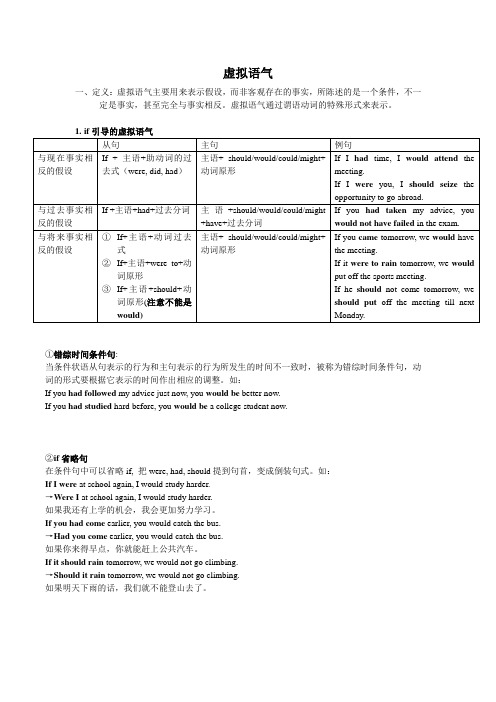
《小小设计师》教案一、教学目标:1. 让学生了解设计的基本概念和原则,培养学生的创新意识和审美能力。
2. 引导学生运用设计思维,解决实际问题,提高学生的实践能力。
3. 培养学生团队协作和沟通能力,提升学生的综合素质。
二、教学内容:1. 设计的基本概念:介绍设计的定义、目的和作用。
2. 设计的原则:讲解平衡、对比、重复、对齐和亲密性等设计原则。
3. 设计思维:引导学生运用设计思维,发现和解决实际问题。
4. 设计流程:介绍设计的基本流程,包括需求分析、创意构思、草图绘制、设计制作和评价反馈。
5. 设计工具:介绍常用的设计工具,如Photoshop、Illustrator和Sketch等。
三、教学方法:1. 讲授法:讲解设计的基本概念、原则和流程。
2. 案例分析法:分析经典设计案例,引导学生理解设计思维。
3. 实践操作法:让学生动手实践,运用设计工具进行实际操作。
4. 小组讨论法:分组讨论,培养学生的团队协作和沟通能力。
四、教学准备:1. 教材:《小小设计师》教程。
2. 电脑、投影仪和音响设备。
3. 设计工具软件。
4. 设计案例素材。
五、教学过程:1. 导入:通过展示经典设计案例,引发学生对设计的兴趣。
2. 讲解设计的基本概念和原则,让学生了解设计的重要性。
3. 讲解设计思维,引导学生运用设计思维解决实际问题。
4. 介绍设计流程,让学生掌握设计的基本步骤。
5. 讲解设计工具的使用,让学生学会运用设计工具进行实际操作。
6. 开展小组讨论,培养学生团队协作和沟通能力。
7. 布置课后作业,让学生巩固所学知识。
9. 对学生的作业进行评价,给予反馈意见。
10. 定期举办设计比赛,激发学生的创新潜能。
六、教学评价:1. 课堂表现:观察学生在课堂上的参与程度、提问回答情况和团队协作表现,给予相应的评价。
2. 课后作业:评估学生作业的质量,包括设计理念、创意构思和执行效果等方面。
3. 小组项目:对小组合作完成的Design Project 进行评价,关注学生的设计思路、创意实现和团队协作能力。
高中英语虚拟语气总结
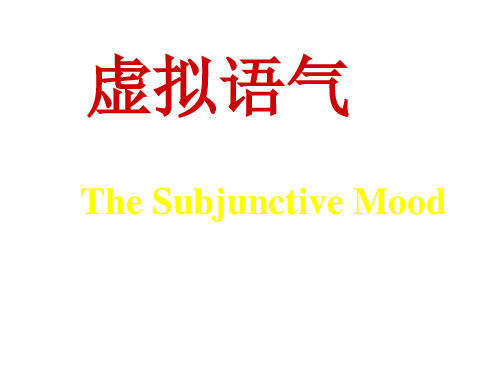
A. was
B. was to be
C. be
D. must be
3.He had an idea that we ______ by bike. A. shall go B. go C. went D. would go
4.My suggestion is that the meeting ______ off till tomorrow. A. to put B. be put C. should put D. be putting
真实条件句用于陈述语气,假设的情况可能 发生,其中 if 是如果的意思。 句型: if条件从句 主句
一般现在时 shall/will + 动词原形 If he comes, he will bring his ball.
The volleyball match will be put off if it ___. A.will rain B. rains C. rained D. is rained 答案B。真实条件句主句为将来时, 从句用一般现在时。
6.If she had worked harder, she ______. A. would succeed B. had succeeded C. should succeed D. would have succeed 7. — If he ______, he ______ that food. — Luckily he was sent to the hospital immediately. A. was warned ; would not take B. had been warned ; would not have taken C. would be warned ; had not taken D. would have been warned ; had not taken 8.If it ______ tomorrow, they would not go there by bike. A. will rain B. rains C. would rain D. should rain 9.______ it rain tomorrow, we would have to put off the visit to the Yangpu Bridge. A. Were B. Should C. Would D. Will 10.If I ______ you, I would not do it. A. am B. were C. shall be D. being
高中英语虚拟语气知识点总结精华(附答案)

高中英语虚拟语气知识点总结精华(名师总结必考语法知识点)第一节语气英语的动词一般可带有三种不同的语气:陈述语气,祈使语气和虚拟语气。
不同的语气用动词的不同形式(有的还借助句法形式)来表示。
第二节虚拟语气的概念虚拟语气是一种特殊的动词形式,一是用来表示说话人所说的话不是一个事实,而是一种假设、猜测、怀疑等(在条件从句中或让步状语从句中);一是表示说话人的愿望、要求、命令、建议等(在宾语从句、表语从句、同位语从句)。
它能实现下列交际功能:a.用来表达一个假设或纯粹的意愿(这种假设或意愿在多数情况下是与事实相反或不太可能实现的。
b. 经常用来缓和语气,使之更加委婉、礼貌、得体,使句子带有推测性和尝试性。
c. 表示烦恼、不耐烦等情绪。
d. 表示适度的责备或批评。
e. 表示美好的祝愿或祝福。
学习虚拟语气在条件句中的用法之前我们必须清楚条件句的种类:条件句有真实条件句与非真实条件句(或称虚拟条件句)两种。
真实条件句所表的假设是可能发生或实现的,句中的条件从句与结果主句都用陈述语气。
如:If it doesn’t rain tomorrow, I wi ll go for a picnic. 假若明天不下雨,我就去野餐。
Oil floats if you pour it on water. 你如把油倒在水里,油就浮起来。
虚拟条件句所表的假设则是不可能或不大可能发生或实现的,句中的条件从句与结果主句皆须用虚拟语气。
第三节虚拟语气在条件句中NOTE:使用虚拟条件句要注意的几点:1.当条件状语从句表示的行为和主句表示的行为所发生的时间不一致时,被称为:错综时间条件句“,动词的形式要根据它所表示的时间作出相应的调整.If you had followed my advice , you would be better now.如果你听我的建议,你现在就会痊愈了.2.在条件句中,可省略if,把were ,had, should 提到句首,变为倒装句式.(后面详细讲解)If you had come earlier, you would have met him.Had you come earlier, you would have met him.1. 与现在事实相反的虚拟条件句,条件从句的谓语用动词的过去式(be的过去式用were), 主句的谓语用should (would, might,could)+动词原形。
高中英语虚拟语气知识点总结
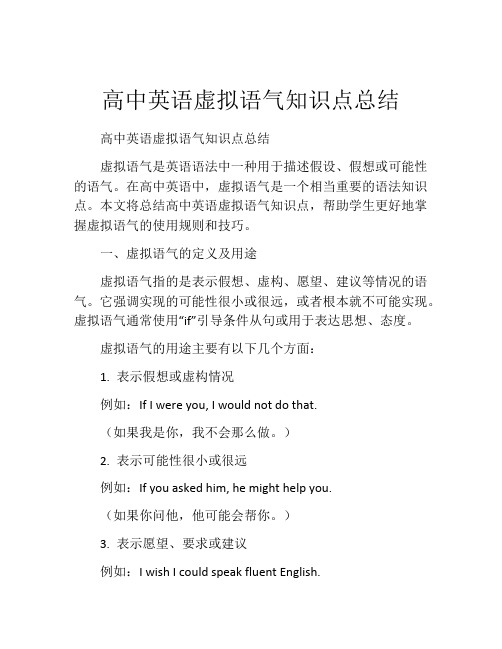
高中英语虚拟语气知识点总结高中英语虚拟语气知识点总结虚拟语气是英语语法中一种用于描述假设、假想或可能性的语气。
在高中英语中,虚拟语气是一个相当重要的语法知识点。
本文将总结高中英语虚拟语气知识点,帮助学生更好地掌握虚拟语气的使用规则和技巧。
一、虚拟语气的定义及用途虚拟语气指的是表示假想、虚构、愿望、建议等情况的语气。
它强调实现的可能性很小或很远,或者根本就不可能实现。
虚拟语气通常使用“if”引导条件从句或用于表达思想、态度。
虚拟语气的用途主要有以下几个方面:1. 表示假想或虚构情况例如:If I were you, I would not do that.(如果我是你,我不会那么做。
)2. 表示可能性很小或很远例如:If you asked him, he might help you.(如果你问他,他可能会帮你。
)3. 表示愿望、要求或建议例如:I wish I could speak fluent English.(我希望我能说流利的英语。
)二、虚拟语气的形式虚拟语气形式主要有以下几种:1. 虚拟语气的过去式:在虚拟语气中,一般用过去式来表示对现在或未来的虚拟。
例如:If I had more time, I would read more books.(如果我有更多时间,我就会多看书。
)2. 虚拟语气的过去完成式:过去完成式用于表示“如果过去已经发生了某些事情,结果会是怎样”。
例如:If I had studied harder in high school, I would have gone to a better college.(如果我在高中时学习更努力,我就能进入更好的大学。
)3. 虚拟语气的“would + 动词原形”形式:“would +动词原形”形式通常用于表示愿望、要求、建议或者可能性。
例如:I wish you would stop smoking.(我希望你戒烟。
)If you would like to come, you are welcome.(如果你愿意来,欢迎你。
2025届高考英语虚拟语气知识点总结+课件
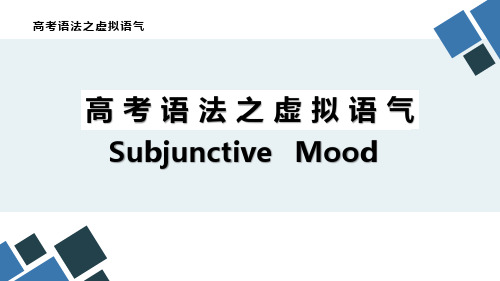
Homework
1. 完成高考汇编关于虚拟语气的练习题; 2. 用虚拟语气完成小诗。小诗的首句已给出。
If I were a bird, I would fly into the sky. ......
Thanks
为什么不用If I am a boy? 为什么不用If I was a boy?
虚拟语气是由句中的谓语动词的特殊形式表示出来的。
动词语气
1、虚拟语气:虚拟语气表示说话人的主观愿望、猜疑、建议或与事实不符 的假设等,而不表示客观存在的事实。 2、虚拟语气是由句中的谓语动词的特殊形式表示出来的。
你会辨认虚拟语气了吗?
对现在的虚拟条件从句
If there were no subjunctive(虚拟语气), English would be much easier.
从句
主句
If + 主语 + 过去式(were),主语 + should/would/could/might + 动词原形
来练一练
1. If there ____w__e_r_e____ (be) no air or water,there ____w_o_u__ld__b_e_____no living things on the earth.
如果我是个男孩 我想我能够明白 爱一个女孩是什么样的滋味 我发誓我会是一个好男人 我会倾听她, 因为我了解
When you loose the one you wanted 失去了你爱的人那有多痛苦
Cause he’s taken you for granted
因为他把你视作理所当然
And everything you had got destroyed! 你的一切都被毁
高考英语语法复习-虚拟语气规则总结3页
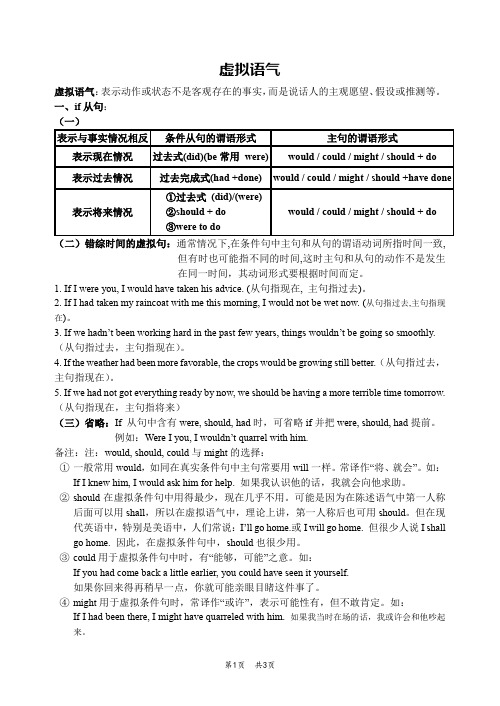
虚拟语气虚拟语气:表示动作或状态不是客观存在的事实,而是说话人的主观愿望、假设或推测等。
一、if从句:(二)错综时间的虚拟句:通常情况下,在条件句中主句和从句的谓语动词所指时间一致,但有时也可能指不同的时间,这时主句和从句的动作不是发生在同一时间,其动词形式要根据时间而定。
1. If I were you, I would have taken his advice. (从句指现在, 主句指过去)。
2. If I had taken my raincoat with me this morning, I would not be wet now. (从句指过去,主句指现在)。
3. If we hadn’t been working hard in the past few years, things wouldn’t be going so smoothly.(从句指过去,主句指现在)。
4. If the weather had been more favorable, the crops would be growing still better.(从句指过去,主句指现在)。
5. If we had not got everything ready by now, we should be having a more terrible time tomorrow. (从句指现在,主句指将来)(三)省略:If 从句中含有were, should, had时,可省略if并把were, should, had提前。
例如:Were I you, I wouldn’t quarrel with him.备注:注:would, should, could与might的选择:①一般常用would,如同在真实条件句中主句常要用will一样。
常译作“将、就会”。
如:If I knew him, I would ask him for help. 如果我认识他的话,我就会向他求助。
专题 10 高考英语语法【虚拟语气】核心考点聚焦 -高考英语

高考英语必背手册专题十虚拟语气考点一、if条件句中的虚拟语气①与现在事实相反If I were you, I would seize the chance to go abroad.②与过去事实相反If you hadn't encouraged me, I would not have been admitted to this university.如果不是你鼓励我,我就不会被这所大学录取。
They might have found a better hotel if they had driven a few more kilometers.如果他们多开几公里的话,他们也许会找到一个更好的旅馆。
I was wearing a seat belt. If I hadn't been wearing one, I would have been injured.我当时系着安全带。
如来没系的话,我会受伤的。
If the new safety system had been brought into use, the accident would never have happened.如果新的安全系统已经投入使用,事故就不会发生了。
③与将来事实相反If it rained/should rain/were to rain tomorrow, I would stay at home.如果明天下雨的话,我就呆在家里。
Grace doesn’t want to move to New York because she thinks if she were to live there, she wouldn’t be able to see her parents very often.格蕾丝不想搬到纽约,因为她认为如果住在那里,她就不能经常看到她的父母了。
④如果主句和从句是对不同时间的事实的虚拟,则被称为错综虚拟语气。
高考英语语法考点归纳总结虚拟语气素材

高考英语语法考点归纳总结:高考英语语法:虚拟语气一.概念: 动词虚拟语气表示说话人的愿望, 假设, 猜测, 建议, 请求, 意图, 设想等未能或不可能成为事实的情况, 或者在说话人看来实现可能性很小的情况, 而不表示客观存在的现实二.虚拟语气的表现形式: 通过句中谓语动词的特殊形式来表现. 这些特殊形式与谓语动词的某些时态相同, 但它们只表示语气, 而不表示时态, 但含有一定的时间概念虚拟语气的用法一.虚拟语气在简单句中的用法: 谓语动词用原形或may +动词原形1.表示祝愿a. Long live our country.b. May you succeed.c. May you be happy all your life.2.表示命令a. Everybody leave the room.二.虚拟语气在非真实条件句中的用法: (使用虚拟语气的含条件句的复合句称为真实条件句)1.表示与现在事实相反的情况时, if从句的谓语用动词的过去式 (be动词的过去式多用were, 而不用was), 主句的谓语用should / would / could / might +动词原形 (should 多用于第一人称, would多用于二三人称, could / might可用于所有人称)a. If I had more time, I should study computer better.b. If he were not so busy, she would attend the meeting this afternoon.c. If they didn’t take exercises every day, they wouldn’t be so healthy.d. If you went to bed earlier, you would not be so sleepy in the morning.e. If she invited me, I should go to the party.2.表示与过去事实相反的情况时, if从句的谓语用had done形式, 主句的谓语用should / would / could / might + have done的形式a. If she had invited me yesterday, I should have gone to the party.b. I would have checked my paper again if I had had more time at yesterday’s exam.c. If you had taken the teacher’s advice, you would not have failed in the exam.3.表示与将来事实相反的情况时, if从句的谓语形式是: ①.完全动词过去式 (be的过去式通常用were); ②.should +动词原形; ③.were to do. 其中②, ③种情况都含有出乎意料之外之意; 主句的谓语的形式是: should / would / could / might +动词原形a. If she should invite me tomorrow, I should go to the party.b. If it rained / should rain / were to rain tomorrow, our picnic would be put off.c. If I saw him tomorrow, I would pass your note to him.d. I might come back if I were to miss the train.三.虚拟语气在非真实条件句中用法的几个变体:1.条件从句省略if: 在书面语中, 如果条件从句中的谓语中有were, had, should等词, 可将if省略, 而把were, had, should放在句首a. Were I you (=If I were you ), I would get up early very early.b. Had you arrived (=If you had arrived ) at the station ten minutes earlier yesterday, you could have caught the train.2.省略条件从句或主句, 省略部分的含义仍有所体现. 省略主句时, 表示己不能实现的愿望a. You could have done it yourself (if you had wanted to).b. I wouldn’t smoke (if I were you).c. If my old friends were with me! (要是老朋友和我在一起该多好啊)d. If you could have seen the wonderful film!3.主从句时间不一致时, 主从句谓语动词的形式取决于要表示的具体时间a. You would speak English well if you had practised speaking it every day.b. If she hadn’t trained so hard, she wouldn’t be able to run so fast.4.假设的条件不以条件从句, 而以其他方式如介词短语、从句等表达出来, 这种句子称为含蓄条件句a. What would you do with a million dollars?b. Without music, the world would be a dull place.c. We could have done better with more money.d. He would have given you more help, but he has been so busy.四.虚拟语气在as if / though从句中的用法:1.表示与现在事实相反或对相在情况有所怀疑, as if / though从句谓语用过去式a. He speaks English so well as if she had studied English in England.b. She looked as if she were ill.2.表示与过去事实相反的情况, as if / though从句谓语用过去完成式a. The machines operated as if it had been repa ired.五.虚拟语气在含even if / though从句的复合句中的用法:在此类复合句中, 若表示与事实相反, 可用虚拟语气形式. 主从句的谓语动词形式与非真实条件句相同a. Even if I were rich, I would work.六.虚拟语气在主语从句中的用法:如果表示说话人的看法, 想法或意见, 在句型 It is / was + adj. + that从句中, 主语从句中可用虚拟语气. 主语从句中谓语动词用should do表示现在或将来情况, 用should have done表示过去情况a. It is necessary that you should clean the lab before you left.b. It is important that you should take the doctor’s advice.c. It was very strange that he should have left without say goodbye.七.虚拟语气在宾语从句中的用法:1.在wish的宾语从句中, 通常表示不可能实现或没有实现的愿望, 常用虚拟语气①.wish的宾语从句用过去式, 表示现在或将来没有实现或不可能实现的愿望a. I wish I knew the result of the match now.b. I wish it were spring here all the year round.c. I wish I could help you.d. I wish I were young.②.wish的宾语从句用过去完成式, 表示过去没有实现或不可能实现的愿望a. We wish we had got the film tickets last night.b. I wish you I had met him yesterday.③.wish的宾语从句若用would, 则一般表示请求, 对现状不满或希望未来有所改变a. I wish the prices would come down.b. I wish you would help me.c. I wish he would be more careful.d. We wish you would spend the holiday with us.2.在动词suggest (建议), advise (建议), demand (要求), require (要求), order (命令), insist (坚持)后的宾语从句中, 谓语动词常用( should )+动词原形的虚拟语气形式a. I suggested that we should go there at once.b. I demand that he should answer me at once.c. The doctor insisted that the patie nt should stay in bed for two weeks.d. The officer ordered that the soldiers should stop playing.与名词suggestion建议 / advice 建议 / demand要求 / request要求 / order命令有关的从句(包括同位语从句和表语从句等)中的谓语也用 ( should ) +动词原形a. The black people made a strong demand that the government ( should ) take steps to change the unfair situation.b. Their demand is that the government should take steps to change the unfair situation.c. I was Bill’s suggestion that everybody should have a map.d. His suggestion was that everybody should have a map.八.虚拟语气用在句型: It is time that(该做某事了)中: that从句中的谓语动词用过去式a. It is time we got up.九.虚拟语气用在if only引导的感叹句中: 表示但愿, 要是就好了, 其中谓语形式与wish 的宾语从句相同a. If only he did n’t drive so fast! ( =I wish he didn’t drive so fast.)b. If only he had take n the doctor’s advice. ( =I wish he had taken the doctor’s advice.)c. If only the rain would stop! ( =I wish the rain would stop.)十.虚拟语气用在would rather / prefer后的that从句中: 表示现在或将来情况谓语动词用过去时形式, 表示过去情况动词用过去完成时形式a. I would rather he came next Saturday.b. I w ould prefer you had seen the film yesterday.c. I would rather that he painted the house blue。
高考英语语法讲解——虚拟语气
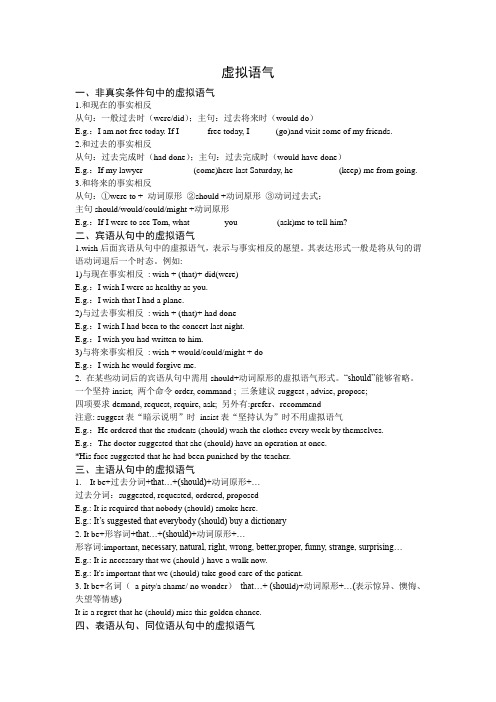
虚拟语气一、非真实条件句中的虚拟语气1.和现在的事实相反从句:一般过去时(were/did);主句:过去将来时(would do)E.g.:I am not free today. If I ______free today, I _____ (go)and visit some of my friends.2.和过去的事实相反从句:过去完成时(had done);主句:过去完成时(would have done)E.g.:If my lawyer ___________(come)here last Saturday, he __________(keep) me from going.3.和将来的事实相反从句:①were to + 动词原形②should +动词原形③动词过去式;主句should/would/could/might +动词原形E.g.:If I were to see Tom, what _______ you ________ (ask)me to tell him?二、宾语从句中的虚拟语气1.wish后面宾语从句中的虚拟语气,表示与事实相反的愿望。
其表达形式一般是将从句的谓语动词退后一个时态。
例如:1)与现在事实相反: wish + (that)+ did(were)E.g.:I wish I were as healthy as you.E.g.:I wish that I had a plane.2)与过去事实相反: wish + (that)+ had doneE.g.:I wish I had been to the concert last night.E.g.:I wish you had written to him.3)与将来事实相反: wish + would/could/might + doE.g.:I wish he would forgive me.2. 在某些动词后的宾语从句中需用should+动词原形的虚拟语气形式。
高考英语语法——虚拟语气

高考英语语法之虚拟语气(一)语气的种类:英语句子中谓语动词的语气有四种:1. 陈述语气(The Indicative Mood)陈述语气用于直截了当地陈述事实、描述状态:He has publishedquite a number of essays this year .他今年已发表了好几篇论文。
2. 祈使语气(The Imperative Mood)祈使语气用于提出请求、命令、建议或是劝告等:Wait outside untilyou are asked . 请在外面等候,请你进再进去。
Let's just take abreak, shall we ? 我们休息一会儿,好吗?3. 疑问语气( the interrogative mood ) :用来提出问题Where are you from?4. 虚拟语气(The Subjunctive Mood)虚拟语气用于表示主观愿望和假设的虚拟情况。
虚拟语气不太顾及事实的存在,它表现出说话人的主观因素比较多。
所以说话人所讲的内容往往是与事实相反的;或是其实现的可能性微乎其微,甚至于没有实现的可能性。
当然,有时为了使说话的语气客气、缓和、委婉,也使用虚拟语气。
If I had moremoney, I would buy a bigger apartment.我要是有再多一点钱,我就买一套更大一些房子。
(二) 虚拟语气的种类:虚拟语气用来表示说话人的主观愿望或假想,所说的是一个条件,不一定是事实,或与事实相反。
虚拟语气在条件(三)虚拟语气的考查难点1.省略if的虚拟语气在虚拟语气中,如果虚拟条件从句中有were,had 或 should,可以把if省略,把这几个词放到主语之前,构成主谓倒装。
难点分析:考点的判断应对策略:分析真实与否Should hecome (If he should come), tell him to ring me up. 他要是来了,让他给我打个电话。
英语虚拟语气知识点总结
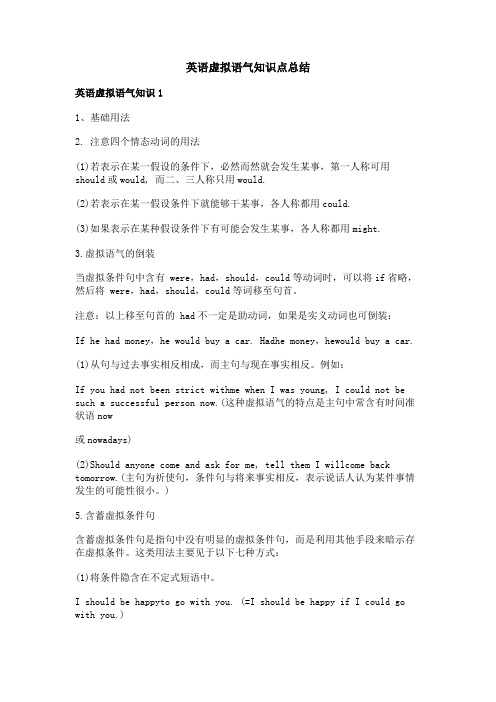
英语虚拟语气知识点总结英语虚拟语气知识11、基础用法2. 注意四个情态动词的用法(1)若表示在某一假设的条件下,必然而然就会发生某事,第一人称可用should或would, 而二、三人称只用would.(2)若表示在某一假设条件下就能够干某事,各人称都用could.(3)如果表示在某种假设条件下有可能会发生某事,各人称都用might.3.虚拟语气的倒装当虚拟条件句中含有 were,had,should,could等动词时,可以将if省略,然后将 were,had,should,could等词移至句首。
注意:以上移至句首的 had不一定是助动词,如果是实义动词也可倒装:If he had money,he would buy a car. Hadhe money,hewould buy a car.(1)从句与过去事实相反相成,而主句与现在事实相反。
例如:If you had not been strict withme when I was young, I could not be such a successful person now.(这种虚拟语气的特点是主句中常含有时间准状语now或nowadays)(2)Should anyone come and ask for me, tell them I willcome back tomorrow.(主句为祈使句,条件句与将来事实相反,表示说话人认为某件事情发生的可能性很小。
)5.含蓄虚拟条件句含蓄虚拟条件句是指句中没有明显的虚拟条件句,而是利用其他手段来暗示存在虚拟条件。
这类用法主要见于以下七种方式:(1)将条件隐含在不定式短语中。
I should be happyto go with you. (=I should be happy if I could go with you.)(2)将条件隐含在分词短语中。
Born in bettertimes, he would have been a scholar. (=If he had been born in better times, he…)(3)将条件隐含在介词短语中。
高中英语语法-虚拟语气全总结
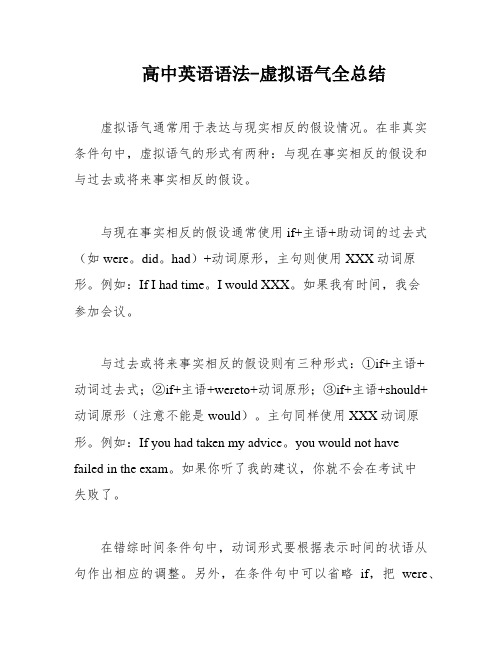
高中英语语法-虚拟语气全总结虚拟语气通常用于表达与现实相反的假设情况。
在非真实条件句中,虚拟语气的形式有两种:与现在事实相反的假设和与过去或将来事实相反的假设。
与现在事实相反的假设通常使用if+主语+助动词的过去式(如were。
did。
had)+动词原形,主句则使用XXX动词原形。
例如:If I had time。
I would XXX。
如果我有时间,我会参加会议。
与过去或将来事实相反的假设则有三种形式:①if+主语+动词过去式;②if+主语+wereto+动词原形;③if+主语+should+动词原形(注意不能是would)。
主句同样使用XXX动词原形。
例如:If you had taken my advice。
you would not have failed in the exam。
如果你听了我的建议,你就不会在考试中失败了。
在错综时间条件句中,动词形式要根据表示时间的状语从句作出相应的调整。
另外,在条件句中可以省略if,把were、had、should提到句首,变成倒装句式。
例如:Were I at school again。
I would study harder。
如果我还有上学的机会,我会更加努力研究。
Had you arrived earlier。
you would have caught the bus.If it rains tomorrow。
XXX climbing.What would you do with a n dollars?We couldn't have finished the work ahead of time without your help.Otherwise。
I would have taken part in the sports meeting.XXX me of your birthday。
or else I would have known nothing about it.A man who s drinking water would be dead in about seven days.I might have been XXX assistance。
高考英语语法——虚拟语气

虚拟语气一、定义:虚拟语气表示动作或状态与事实相反,或不可能发生的情况。
1.虚拟语气用于条件状语从句中1)表示与现在事实相反或不可能发生:一般过去时(虚拟语气中be→were)Eg. If he had time, he would (could, might) go with youEg.If I were you, I would work hard.2)表示与过去事实相反或不可能发生Eg.If I had time last night, I should have come to see you.Eg.If they had helped us, we would have finished the task. (实际上没帮)3)表示与将来的事实可能相反或不可能发生Eg.If it should rain, the crops would be saved.Eg.If it were to snow tomorrow, they would not go out.4)※注意:虚拟语气的倒装语序:如果if从句里含有should, had, were或其他助动词,则可将从属连词if省去,将助动词.情态动词.be或have放在句首形成部分倒装.Eg.If I had time, I would have done that yesterday.=Had I had time, I would have done that yesterday.Eg.If I were you, I would go to the party.=Were I you, I would go to the party.Eg.If it should rain tomorrow, I would stay at home=Should it rain tomorrow, I would stay at home.2. 虚拟语气在宾语从句中的用法在动词wish后的宾语从句中,表示与现在或过去的事实相反,或对将来的主观愿望,从句通常省略连词that。
高考英语语法之虚拟语气

⾼考英语语法之虚拟语⽓⾼考英语语法8虚拟语⽓⼀,if条件句中的虚拟语⽓虚拟语⽓是⼀种特殊的动词形式,主要⽤于在条件或让步状语从句中,表⽰说话⼈所说的话不是⼀个事实,⽽是⼀种假设、猜测、怀疑等;或者在名词性从句中,表⽰说话⼈的愿望、要求、命令、建议。
条件句有真实条件句与⾮真实条件句两种。
虚拟语⽓在条件句中:1,与过去事实相反的假设:条件句: If+主语+had done主句:主语+should, would, might, could + have doneShe would have gone to the party if she had been invited.2, 与现在事实相反的假设: 条件句: If+主语+did, 动词be⽤were主句:主语+should, would, might, could do3,与将来事实相反的假设:条件句: If+主语+did, 动词be⽤wereIf+主语+were to do;If+主语+should do主句:主语+should, would, might, could do, If it should fail, I would try again.4. 混合型的条件句当条件从句与主句所表的时间不⼀致时,虚拟语⽓的形式应作相应的调整。
主句和从句的谓语动词并不相互呼应,这种条件句叫混合条件句或错综时间条件句。
If you had followed my advice , you would be better now. Even though it hadn’t rained, we can’t get there by tomorrow. 条件虚拟主句真实。
⼆,名词性从句that+主语+(should) do结构中的虚拟语⽓下列情形下that 后⾯的从句中的谓语动词⽤:should do,should可以省略。
表过去⽤should have done.1,主语从句:在句型It is important/necessary/strange/natural that句型中,在It isdemanded/suggested/ordered/required/recommended/requested/ required that句型中,在It is a pity, a shame, no wonder, proposal, recommendation, suggestion, surprise, advice that句型中,表⽰某事重要、奇怪、⾃然、必要等,以及表⽰建议、命令、请求、道歉、怀疑、愿望等主观意愿等。
- 1、下载文档前请自行甄别文档内容的完整性,平台不提供额外的编辑、内容补充、找答案等附加服务。
- 2、"仅部分预览"的文档,不可在线预览部分如存在完整性等问题,可反馈申请退款(可完整预览的文档不适用该条件!)。
- 3、如文档侵犯您的权益,请联系客服反馈,我们会尽快为您处理(人工客服工作时间:9:00-18:30)。
高考虚拟语气总结
一.概念:
虚拟语气是扯淡的句子。
我们在初中二年级学习过一个句子:If I were you, I would call him now.
虚拟语气有从句和主句。
高考考的就是从句和主句里分别用的什么时态。
为什么用I were,而不用I was?因为我不是你,所以只能I were.
If I had 5 million,I would buy a Lamborghini.
二.按时间分类
从句主句
跟现在相反were(did) would do
跟过去相反had been(had done) would have done 跟将来相反were to do would do
Should do
首先记住一句话If I were you ,I would do it now.然后再进行推导。
高考考的最多的是跟过去相反。
跟过去相反,主句从句中都有have 的身影。
跟现在相反的口诀:主过将,从过
跟过去相反的口诀:主过将完,从过完
三.现在
If I ___ you ,I wouldn’t return the call.
A.Be
B.Am
C.Was
D.Were
Were it not for the snowy weather,we ___be all right.
A.Would be
B.Would have been
C.May be
D.Were
____I you, I would go with him to the party.
A.Was
B.Had been
C.Will be
D.Were
四。
过去
If I ____more time,I would have gone with him.
A.Had
B.Had had
C.Have had
D.Would have
If we ___here ten minutes earlier, we___the bus. A.Arrived ;would catch
B.Arrived; would have caught
C.Had arrived;had caught
D.Had arrived;would have caught
五.将来
If it were to snow this evening,we would not go out.
If it were Sunday tomorrow, I should go to see my grandmother.
六.混合虚拟
If I were you, I would have taken his advice.
If he had listened to the teacher attentively,he would know the answers now.(注意本句中的now)
--Could you tell me how to do this excercise?
--Well,if you had listened to the teacher yesterday, you would know how to do it now.
混合虚拟中有明显的时间状语提示你。
If you were older, I ___you to go there yesterday.
A.Will allow
B.Would have allowed
C.Should allow
D.Had allowed
七.Wish的用法
跟现在相反:wish +主语+did(were)
跟过去相反:wish+主语+had done/would have done
跟将来相反:wish+主语+would do
I left early last night,but I wish___so early.
A.Hadn’t left
B.Didn’t leave
C.Couldn’t leave
D.Haven’t left
I wish I___able to tell him all about it last night.
A.Was
B.Were
C.Had been
D.Should be
落地检验——高考真题:
--Where are the children? The dinner is going to be completely ruined.
--I wish they___always late.
A.Weren’t
B.Hadn’t been
C.Wouldn’t be
D.Wouldn’t have been
Maybe if I ___science,and not literature then,I would be able to give you more help.
A.Studied
B.Would studied
C.Had studied
D.Was studying
--The weather has been very hot and dry.
--Yes,if it had rained even a drop,things would be much better now!And my vegetables____.
A.Wouldn’t die
B.Didn’t die
C.Hadn’t died
D.Wouldn’t have died。
